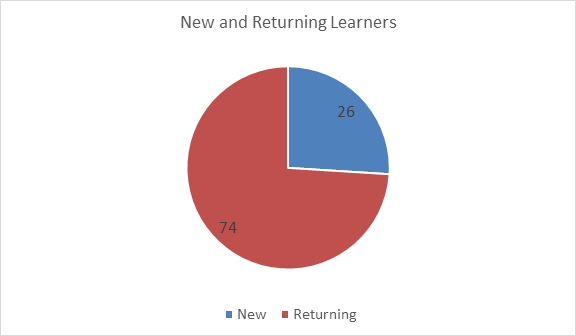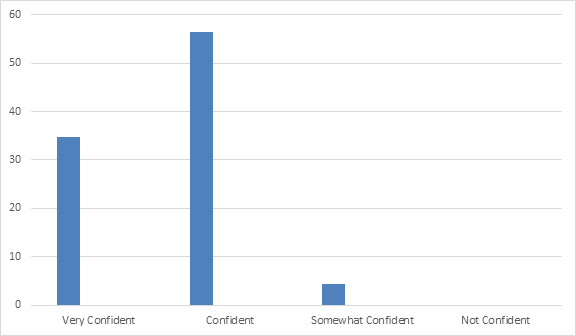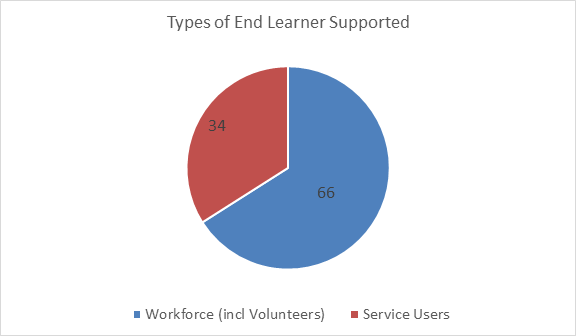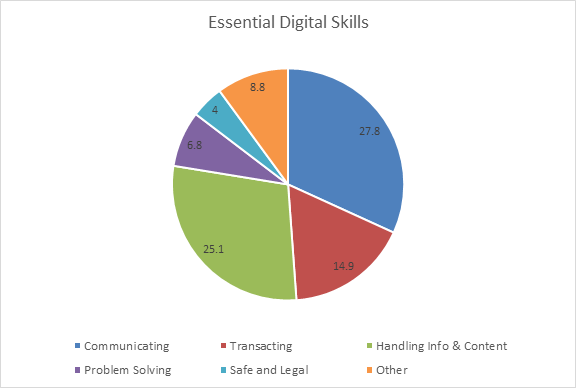A week in the life of a digital champion
Around 1 in 5 adults in Scotland do not have the digital skills that they need to make the most of new digital technology. The divide is becoming narrower but deeper, and the people who don’t have digital skills are also likely to face other types of disadvantage, such as poverty and disability.
The evidence tells us that the best way to help people to develop skills is through informal learning, delivered by a trusted person. SCVO are therefore working with charities from across Scotland to turn frontline staff and volunteers into ‘embedded’ Digital Champions (DCs) who can help people to become more digitally confident. Between Jan 2018- April 2019 SCVO partnered with 41 organisations, to train 257 Digital Champions.
Digital Champions help other people to gain the digital skills they need for life and for work. They display the passion for digital and people skills required for this role and are generally people who have a good level of digital confidence, but they are not required to be experts.
How we monitor the impact of Digital Champions
The embedded champion model does not encourage DCs to set up formal learning sessions and record baseline and follow up data about learner progress. Rather DCs are encouraged to provide regular small levels of support to build confidence and increase motivation. We ask all DCs to estimate the number of people they will help with digital skills at the end of their initial training.
One of the challenges we have faced is how to monitor, evaluate and measure the impact Digital Champions are having. There are a variety of reasons for this:
- DCs not recognising the work they are doing as “digital” i.e. showing someone how to use Whatsapp or logging in to a Netflix account
- Not mandating a specific monitoring method
- Working with a diverse range of roles and organisations
- Variable estimates around the quantity of activities
Facing a similar issue, our partners at Citizen’s Online developed ‘Snapshot Week’ as a method for evaluating the work being done by their Digital Champions. They asked Digital Champions to keep a tally of the number of people they helped over the course of a week and asked them to record if this was a typical week and whether the people they supported were new or returning learners.
Following a successful pilot last year, SCVO ran our second Snapshot Week from 13-20 March 2019 and invited a selection of our most recent DC organisations from across Scotland to take part.
Sixteen organisations agreed to take participate and of the few approached who didn’t, there were a variety of reasons for this:
- Our lead contact at the organisation had moved on; there was no-one else who felt able to help
- Staff shortages
- Some were involved in end of year reporting and didn’t have the capacity
- Some felt they had received the training too recently to be able to participate effectively.
Key insights
This report provides detailed analysis of the data returned by 46 Digital Champions. We have summarised three key insights from these returns:
DCs underestimate what they will be able to do
The One Digital programme records information about the number of unique end learners supported to develop digital skills. SCVO use estimates for these figures, provided by DCs at the end of their training. The data from snapshot week suggests we are significantly under-reporting.
Possible reasons for this:
- At the end of the training DCs are likely to be conservative with their estimates
- There are a significant number of ‘returning’ users being supported but these numbers are not included in the core performance indicators for funders
- The DCs who engaged with snapshot week are a self-selecting sample and likely to be more active thank DCs who did not participate
Lots of DCs are supporting their colleagues and volunteers
Initially SCVO were interested in supporting DCs in order to develop the skills of people in the community. However, it has become clear that in many organisations staff need ongoing skills support, and this is reflected in the figures showing that 70% of the interactions taking place were with staff and volunteers.
Small regular interactions are taking place
Our model of DC support promotes and encourages small and regular interactions, rather than more intensive digital classes. The examples that have been provided show that this is what is happening, and that the full range of Essential Digital Skills are being provided.
- In terms of the ESD Framework the kinds of activity were mostly around communicating i.e. using Skype and social media platforms and handling information and content i.e. online banking or applying for Universal Credit
- There seems to be less of a focus on being safe, secure and legal online, however this may be due to this being underpinned within the activities taking place within the other sections of the Framework
- The high number of return learners (70%) is good to see, showing that people are coming back to their trusted DC for ongoing support
Examples of organisations and activities
Linstone housing
Anticipating the rising demand for support from their residents as Universal Credit continues to be rolled out across Scotland, Debs Allan (Project Coordinator at Linstone Housing Association) had been in touch with SCVO prior to the above project to provide Digital Champion training to some of the frontline staff within the organisation.
Overall the training was well received, with even the most ‘digitally resistant’ attendee of the 13 staff members who participated, able to recognise the importance of digital inclusion by the end of the day. He said he felt it had been a valuable experience and was a good use of his time.
Since the training took place Debs says there have been increased levels of conversation around what people are doing to support tenants digitally.
They've started looking at more digital tools and are making more use of the public tablets when working with the public in their community hubs.
Linstone were keen to participate in Snapshot week and of the ten DCs who received training, eight provided responses. The DCs reported they supported 25 people over the course of the week, split fairly evenly between new and returning learners and mainly helped tenants connect to WiFi, access emails and navigate various social media platforms.
Airdrie CAB
In order to be able to provide this service to as many people as possible, SCVO have also developed a shortened version of the Digital Champions training as some organisations have struggled to find the capacity to allow staff to be out of the business for a full working day.
SCVO trialled this in October 2018 with staff members working within Airdrie Citizen’s Advice Bureau. They were one of the first to receive this and overall feedback has been positive.
The training was delivered to seven frontline members of staff who are routinely asked to help clients who are lacking in essential digital skills. The staff who attended said they felt the training would help in their daily jobs as they would feel more comfortable advising clients on how to do things online, especially around online safety, password protection etc and this has been evidenced through follow up calls and meetings with project leads following this.
In addition, the Champions are focusing on getting people to learn to do things themselves instead of doing it for them. They always show people what a secure website looks like and to be careful about the information they share online. They have had a lot of people starting to use online banking and paying bills online and the feedback has been that this is making people’s lives easier. They are also advising people things are quicker online in terms of services such as claiming tax rebates online.
Snapshot week findings
Sixteen organisations agreed to take part in snapshot week from 13 –20 March 2019, and of those sixteen, we received responses from fourteen, an 87.5% conversion rate.
Digital Champions from each organisation were asked to record information about the work they did to help people develop digital skills during that week.
Number of end learners
| Indicator | Responses (actual) |
| Number of organisations signed up | 16 |
| Number of organisations responded | 14 |
| Number of digital champions returning data | 46 |
| Number of end learners per week (new and returning) | 192 |
| Average number of end learners per week (new) | 4 |
| Average number of end learners per week (returning) | 10 |
| Indicator | Responses (extrapolated) |
| Average number of end learners per month (new) | 17 |
| Average number of end learners per month (returning) | 43 |
At end of each training session SCVO asks all DCs to estimate the number of people they will be able to support in a month. According to these estimates a DC will help (on average) four people in any given month.
This data shows that those estimates are under-reporting the actual activity taking place. The 46 digital champions who returned data for snapshot week helped an average of 17 new learners, and 43 returning learned each month.
New and returning learners
New learners are people who have never received support from a Digital Champion before and returners are people who have had multiple digital interventions e.g. regularly attend a digital skills class.

Confidence of Digital Champions

Was this a typical week?
DCs were asked if this was a typical week, to check whether there were unusual levels of DC support e.g. during Get Online week.
Eight people responded that is was not a typical week, but the reasons for this would not have unfairly skewed the data as the majority were due to annual leave or a new member of staff joining the team.
Types of end learner supported
When we piloted this last year we were surprised to see the majority of DCs were supporting other colleagues and volunteers within their organisation, as well as of service users/members of the public.
In order to capture this data more effectively this time we modified the form we ask DCs to complete (appendix 2) to separate people supported in to workforce (incl volunteers) and service users. The graph below demonstrates this and shows overall DCs are supporting more people within their workforce than service users.

Examples of support provided

Note- these categories have been applied by SCVO to the examples given by DCs. A selection of examples includes:
“Assisted a client to create then access an email address then supported another client to make a claim for Universal Credit”
“Helped someone save a document in a specific location, helped someone with the layout of a document, and helped someone with email footers/signatures.”
“Applied for library card and accessed WiFi once received, helped access and complete an online form, assisted with access.”
“How to source furniture online for a new home. Showed customer how to find post codes. Helped customer fill out a Housing Benefit form online.”
“Showed client how to use their new stylus, remapped client’s keyboard so that keys produced the expected characters, showed colleague how to zip/unzip files/folders, and showed client how to send an email to a contact.”
We also asked the DCs if there was anything they required further support with. The majority said no, however the responses we did get asked for help on:
- How to teach graphic design for people with learning disabilities
- Training on data protection practices
- Help with Excel
Next steps
The organisations SCVO work with become involved with us in a variety of ways, whether they have attended one of our practitioner events, applied for Charter Funding, signed the Digital Participation Charter, taken part in our Senior Leaders Programme or have used our Toolkit to measure their Essential Digital Skills. In addition we have recently started work on a project to create a Digital Champions network within social housing organisations in Scotland and will be using this technique within our monitoring and evaluation.
We plan to widen the opportunity to participate in snapshot week to all organisations that we engage with, across the range of participation programmes. This will involve:
- A detailed timeline of when Snapshot week will take place and when we require responses returned to us. We will also send out reminders during the Snapshot period to help DCs remain focused.
- A copy of the form in advance to allow organisations to look over this and come back with questions/additional requirements/amendments in advance
- One to one support prior to Snapshot week to ensure organisations are clear on the process and happy with the requirements
- In order to improve this method for future organisations participating in Snapshot Week, we will make the following amendments:
- We will include guidance on this process in our DC training agreement before organisations are onboarded, will discuss it within the training itself and promote this method to external and partner organisations
- We will use this method in order to monitor and evaluate our DC housing association project and will make this an essential requirement of project participation
- We will repeat this with our new DC organisations in Autumn 2019 and aim to make this a bi-yearly event
- Advice for organisations participating in future rounds:
- Discuss the process with DCs in advance to ensure they are clear on dates, how to record the numbers/use the form and what ‘digital’ looks like
- Include figures based on workforce as well as service users supported
- Provide real-life examples – we want to celebrate your success so qualitative data is just as important as quantitative
- Ask questions and provide feedback! We are here to help and welcome and input we get
- Return your responses on time – otherwise we may be unable to include them in our results reporting
If you'd like to get in touch and learn about Digital Champion training, or any of the work from this piece, contact us at digital@scvo.scot or see our Digital Champions page.



